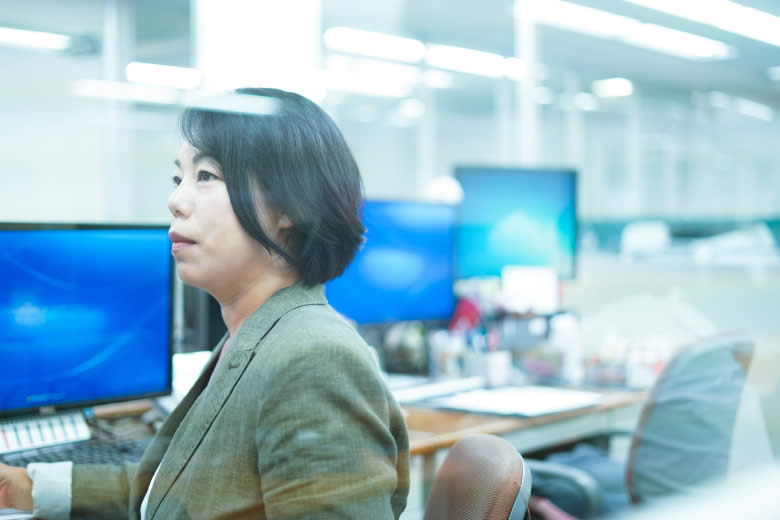The text is from here.
Management Interview "Central Systems Co., Ltd."
To value the individuality of each individual. This will lead to the creation of an organization with a relationship of trust. (Representative Director: Hisao Onishi)
Last updated on July 29, 2024.
Corporate introduction
In 1983, Central Systems started with a special focus on the design and development of core business systems. Currently, it is a company that provides a wide range of services, from the development of business systems and embedded software, to infrastructure construction, system operation and maintenance, and medical cloud services. The number of employees is 140. Of these, 28 are women. This time, Mr. Toshiro Onishi, a representative who respects the independence and independence of each employee, spoke about women's work styles, including a management view.

Question 1. First, please tell us about the employment of women in the system industry.
Until a long time ago, it was really rare for women to work in the system industry. In particular, it counts as SE in charge of development. When I first established my current company, I had little hiring women. It wasn't until the 2000s that it was actively adopted. There was a fact that Japan's labor force is declining due to the declining birthrate and aging population. That's why I began to pay attention to women. However, when we actually adopt it, I realize that the power of women will be a major force for companies in the system industry in the future. First of all, I have a wide field of view. Now, I'm good at what to do and how to prioritize things. In addition, since it works from the customer's point of view, communication skills are also high. If we can utilize these characteristics in sales, management, and management, I think we will further expand opportunities for women to play an active role in the system industry. In fact, we are also active in sales and consulting services, such as female employees who have gained experience as engineers draw out and analyze client needs.
Question 2. Do you have any cautions in supporting female employees?
Currently, of the 28 female employees, 4 have children under elementary school age. Among them, one person is on childcare leave, one person is on shift work, and one person is working from home, and we support employees who have returned from childcare leave to work for a long time, such as a system for employees who are raising children and consideration for working places. What is important in establishing the system is to create an environment where all employees can work with peace of mind, not just women raising children. Our goal is to promote diversity. At that time, what is important is not to be particular about institutionalization. I have different circumstances. Now, what I'm talking to female employees is creating rules that can be determined on a case-by-case basis. For example, even if you work shorter hours, you don't have to leave at 4 o'clock uniformly. At the root of rules-making, there is a need for a perspective on how to make parties easier. The good thing about small and medium-sized enterprises is that they can create rules while looking at each person in such a case. In addition to building only systems and systems, I would like to make all employees aware of the need to promote women's empowerment and diversity, and to take root as an internal culture.
Question 3. What kind of initiatives are you taking in hiring women?
In the future, we believe that many women will play an important role in the survival of the company. As a result, the recruitment of women is a huge factor for our company. In that sense, it is fundamental to establish a support system such as childcare leave and shortened working hours. However, even if you want to actively recruit women, this support system is not easily communicated. Therefore, I once handed out internal explanatory materials for employees using the system at a joint university briefing. Then, five of the ten people hired were able to hire women and the largest number of women since the establishment of the company. Since then, we have created a Diversity Study Group and held meetings on working styles several times a year. Of course, it is also held for male employees. Now, with a variety of employees, we have to find a way of working that suits individuals. Some women are conscious of their careers and draw a vision for the future. On the other hand, some people say they don't want to be more responsible when their position is up. You can provide that option according to your individual. I think that's the appeal of small and medium-sized enterprises.
Question 4. Finally, what do you think is important in promoting the active participation of women?
Of course, the policies of the national and local governments become important, but I think it is important not only to expect them, but also to think about what a company can do and act accordingly. In order to do so, we should be aware of each employee as a different personality, rather than as a number of employees. As I say many times, regardless of gender, individual adequacy and ability are different. On top of that, it's important. I don't think there will be any necessary systems or support unless we can build trust between companies and employees. Furthermore, when considering the long-term employment of women, male cooperation is essential. Life events such as child care and nursing care still have a large proportion of women. There are only men who can reduce it. In the future, I would like women to take on the role of directors. Although the number of excellent employees is increasing, I think it is important to provide a place where women can play an active role independently as one of the support measures.
Voice of Female Employees
Miyuki Owaki (Joined in 2001)

After graduating from university, I got a job as a programmer at a software development company. At that time, it was still rare for women to work in the system industry. When I got married, I left the company from the implicit company pressure, "Do you want to stop?" But after all, if you don't have a connection with society, it's boring. A few years later, I started working again as a clerk. But this time, it's not rewarding to just work. When I wanted to work in system development, I met Central Systems. I was worried about blanking as a technician, but the fact that the president saw humanity was the decisive factor in joining the company. The work of system development is mountains and valleys. Sometimes it's hard both physically and mentally, but I'm really happy when customers say "Thank you" or "I was saved" after the release. Also, this company is easy to work because you can feel that you are looking closely at each person. The work style after childcare leave also responded in detail while watching the actual situation, and I think it was good to choose the current company for raising children.
Company Information
Central Systems, Inc.
6-68-1 Sumiyoshi-cho, Naka-ku, Yokohama Sekinai Land Building 4F
http://www.cscweb.co.jp/ (external site)
Industry: Software
Number of employees: 142 people
Female Support System: Maternity leave system / reduced working hours system
Inquiries to this page
Economic Affairs Bureau Small and Medium Enterprise Fisheries Promotion Department Small and Medium Enterprise Promotion Division
Phone: 045-671-4236
Phone: 045-671-4236
Fax: 045-664-4867
E-Mail address [email protected]
Page ID: 846-525-072







